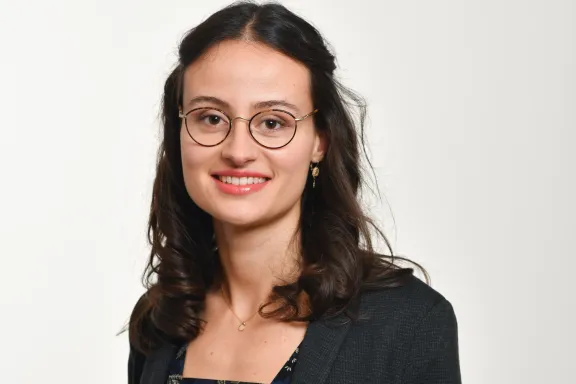Juliette Fedry Observing the transformation of proteins within the endoplasmic reticulum
Juliette Frdry, post-doctoral fellow, CryoEM group, Utrecht University (Netherlands), under the supervision of Professor Friedrich Forster
- 2018 • Bettencourt Prize for Young Researchers

The 2018 Bettencourt Young Researchers Prize was awarded to post-doctoral student Juliette Fedry for her work on protein processing in the endoplasmic reticulum.
Seeing proteins degrade and transform
For her PhD, Juliette Fedry determined the structure of HAP2, the first known membrane fusion protein in all classes of non-viral organisms. Her findings, published in Cell in 2017, shed light on how HAP2 fuses two cell membranes.
Her post-doctorate will focus on the use of electron cryotomography, a cutting-edge technology whose developers won the 2017 Nobel Prize for Chemistry. Electron cryotomography will allow her to view, for the first time, proteins addressed to the endoplasmic reticulum membrane, a cellular compartment involved in protein modification and degradation.
The findings could benefit research on diseases such as epilepsy, Alzheimer's disease and cystic fibrosis, which are associated with defects in endoplasmic reticulum function.
Juliette Fedry in a few words
Thesis: “Structural and Functional Study of Cell Fusion Mediated by the HAP2 Protein", under the supervision of Dr. Felix Rey and Dr. Thomas Krey, Pasteur Institute (Paris), Medicine, Toxicology, Chemistry and Imagery Graduate School - Specialization in Structural Biology, Université Paris Descartes
POST-DOCTORATE: “Electron Cryotomography Studies of MHCI Biogenesis and Degradation at the Endoplasmic Reticulum Membrane", under the supervision of Prof. Friedrich Forster, CryoEM group, Utrecht University, The Netherlands
Bettencourt Prize for Young Researchers
Created in 1990, the Bettencourt Prize for Young Researchers is one of the first initiatives of the Fondation Bettencourt Schueller. Until 2021, this prize was awarded each year to 14 young doctors of science or doctors of medicine, to enable them to carry out their post-doctoral stay in the best foreign laboratories. 349 young researchers were distinguished. The prize endowment was €25,000.
All the award-winners